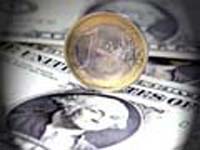Dollar up slightly against euro
As consumer confidence slipped in France, one of Europe's largest economies, euro fell against dollar Thursday.

In morning European trading, the euro bought US$1.4745, down from US$1.4857 the night before in New York. The British pound slipped to US$2.0652 from US$2.0812, while the dollar rose to 110.09 Japanese yen from 109.97.
The dollar had slipped widely Wednesday after investors took statements from U.S. Federal Reserve Vice Chairman Donald Kohn to indicate that more U.S. interest rate cuts may be in store.
Although lower interest rates can jump-start an economy, they can also weaken a currency as investors transfer funds to countries where they can earn higher returns.
The dollar found support Thursday, however, after the French consumer confidence index dropped in November as households grew more pessimistic about making large purchases and their ability to save.
The index declined to minus 28 from a revised minus 23 in October, according to national statistics office Insee. Economists had expected a reading of minus 24, according to a Dow Jones Newswires survey.
The report again calls "into question whether the ECB can afford to be any more hawkish with their monetary policy," said James Hughes, an analyst with CMC Markets.
On Wednesday, the GfK research group reported that consumer confidence in Germany fell for the fourth consecutive month.
The skyrocketing euro, which hit an all-time high of US$1.4966 last week, has begun causing widespread concern among European businesses that it could begin to hurt exports seriously.
Most recently, Porsche CEO Wendelin Wiedeking called in a radio interview Thursday for European finance ministers to devote more attention to the sharp rise in the currency, calling dollar weakness a "huge problem" for companies.
Subscribe to Pravda.Ru Telegram channel, Facebook, RSS!




